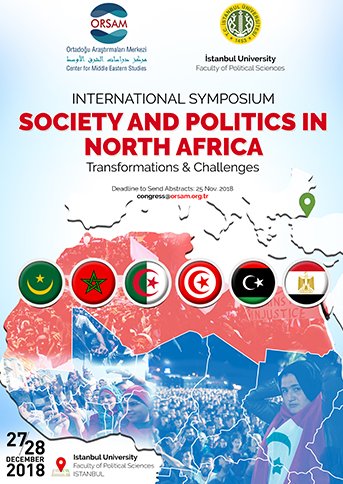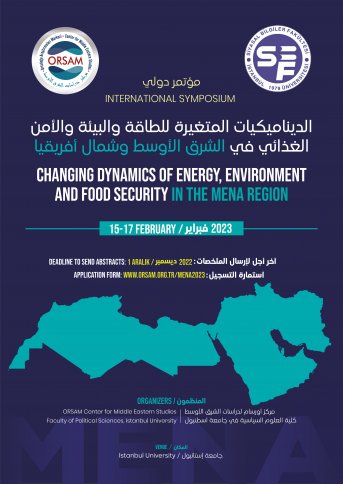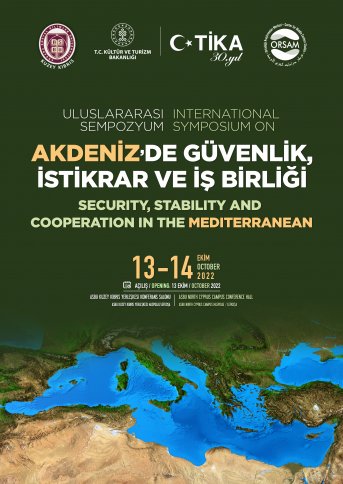
Society and Politics in North Africa: Transformations & Challenges
INTERNATIONAL SYMPOSIUM
SOCIETY AND POLITICS IN NORTH AFRICA: Transformations & Challenges
27-28 December 2018
[Download Symposium Timetable]
The problematic of the conference:
For nearly two decades, North African societies have undergone significant and fundamental transformations in their social, cultural and religious patterns that have created problems and dangers for their societies. Some of the North African countries suffered from tribal disintegration (e.g. the Libyan case) and conflicts that threatened Libya's existence as a state. Tunisia witnessed a transformation as a positive leap towards the future in its first phase, but subsequent ideological conflicts showed that the process of transformation and construction in the new Tunisian state still needed time to mature the process of social and political harmony among various components of society.
In Algeria, the building of social consensus is still evolving and the deep differences between different ideological frameworks continue to affect the building of a cohesive community. In Morocco, social protest movements seem to have made the social and political struggle that might affect any future development. In Mauritania that is witnessing a new political experience, it is still suffering from the issues of social exclusion and marginalization of social groups that are excluded from all benefits of economic wealth. In Egypt, the image of the future, based on political and social partnership among all components of society, is not clear based on their social and cultural orientations.
This whole context reflects the survival of the dream of building a region of social cohesion and strong economic development that is far from realization but has also led to the emergence of deep problems that have not been resolved so far: Illegal immigration, unbalanced development, and the emergence of ineffective institutional communication among social and political actors and even elites, and problems of deviation among young people and high rates of urban and non-urban crime.
The social and political change in North African societies has not yet led to the building of fruitful projects. They were not able to move them from socially dysfunctional and socially disintegrated societies to a framework that brings together all of the cultural, political, social and cultural elites that drive their economic takeoff and achieve a balanced development to meet society's needs and challenges. Therefore, within this problematic framework, the important questions arise:
How have social, economic and cultural transformations affected North African societies?
Objectives of the Conference:
The conference aims to:
• Identify the historical dimensions that affect the lack of a deep positive changes in the societies of North Africa?
• Identify the social constraints affecting the lack of a deep positive changes in North African societies?
• Identify the economic constraints affecting the lack of a profound positive changes in North African societies?
• To identify the cultural obstacles affecting the lack of a deep positive changes in North African societies?
The importance of the conference:
The importance of the conference comes mainly from trying to understand the factors that led to the societal underdevelopment in certain countries - an important geostrategic space - in terms of their inability to achieve economic growth or real development. This symposium also hopes to elaborate the factors that lead to the lack of social transformations in the North African countries despite serious changes in those societies.
Conference Themes:
We suggest some basic themes and participants can propose topics that fall within the context of the conference.
1 - The reality of social transformation in the societies of North Africa: Political, cultural, social, historical, economic, etc.
2 - The societal, cultural, historical, and economic obstacles to achieving comprehensive social development in North African societies,
3 - The impact of social, cultural, communication, historical and economic transformations on North African societies,
4 - Prospects and challenges of building a North African mass space that achieves social, cultural and economic development in in North African societies.
5 - North African societies and the current transformations after 2011 (politically, culturally, intellectually, socially, economically, etc.).
Who Can Participate in the Symposium
Participation in the conference is open to specialists in the field of social sciences and humanities.
1 - Experts, specialists and academics.
2 - Centers of strategic thinking and research in the region and those interested in the region
3 - Media practitioners
4 - Decision makers and interested
5 - PhD students
Terms of Participation
- Papers written in Arabic, Turkish or English
- Search does not exceed 15 pages (single space)
- Abstract does not exceed 200 words
- If you type in Arabic, the font type is Times New Roman or Calibri 12 points.
- Citation is end-note and references.
- The author of the article respects the scholarly criteria and can send only a novel work.
- The abstracts to be sent to the email: congress@orsam.org.tr
Important Dates:
- Deadline for submission of abstracts 01 December 2018
- Announcement of Accepted Abstracts 08 December 2018
Registration fee: 150 Euros (covers symposium implementation and proceedings book)
- The conference will help find special rates for those wishing to stay in a hotel close to the conference
Symposium Administration:
- Honorary Director: Prof.Dr. Mahmut AK, President of the Istanbul University, Turkey
- Director: Prof.Dr. Ahmet Uysal, Director of ORSAM Istanbul University, Turkey
- Vice Director: Prof.Dr. Faouzi Bendridi, Souk Ahras University, Algeria
Advisory Board (Alphabetical Order):
- Prof.Dr. Akif Kireçci, Bilkent University, Turkey
- Prof.Dr. Alâ el-Zeyyat, Monufia University, Mısır
- Prof.Dr. Ayşegül Komsuoğlu, Istanbul University, Turkey
- Prof.Dr. Birol Akgün, Ankara Yıldırım Beyazıt University, Turkey
- Prof.Dr. Buhanettin Duran, İbn Haldun University, Turkey
- Dr. Fatima Rumat, Muhammed V University, Rabat, Morocco
- Prof.Dr. Fuat Erdal, İbn Haldun University, Turkey
- Prof.Dr. Haluk Alkan, Istanbul University, Turkey
- Prof.Dr. İsmail Kira, Skikda University, Algeria
- Prof.Dr. Kemal İnat, Sakarya University, Turkey
- Prof.Dr. Mesut Özcan, Academy of Diplomacy, Turkey
- Mr. Muhammed Camil Mansur, Director of Mauritania Strategic Research Center, Mauritania
- Prof.Dr. Muhittin Ataman, Social Science University, Turkey
- Prof.Dr. Muhsin Kar, Niğde Ömer Halisdemir University, Turkey
- Dr. Samira El-Velhazi, Director of El-Kef Center for Applied Human Sciences, Tunisia
- Prof.Dr. Yusuf El-Kasımi, Guelma University, Algeria
- Prof.Dr. Yusuf Tekin, Hacı Bayram University, Turkey
- Prof.Dr. Zekeriya Kurşun, Fatih Sultan Mehmet V. University, Turkey
- Dr. Zouhair Bouamama, Expert of Political Science and International Relations, Algeria
Scientific Committee (Alphabetical Order):
- Prof.Dr. Abderrahman el Moudden, Muhammed V University, Morocco
- Dr. Abbas Boughalim, Muhammed I University, Morocco
- Dr. Abdelwahhab Khalid, Batna University, Algeria
- Dr. Abduti Âli, Center for Strategic Research and Studies, Mauritania
- Dr. Ahmet Gökçen, Muş Alparslan University
- Prof.Dr. Ahmet Öztürk, Istanbul University, Turkey
- Doç.Dr. Ayşe Zişan Furat, Istanbul University, Turkey
- Dr. El-Fakih El-Şeyh Veled Ezzeyn, High Islamic Council, Mauritania
- Dr. Gökhan Bozbaş, Center for Middle Eastern Studies (ORSAM),Turkey
- Dr. Göktuğ Sönmez, Center for Middle Eastern Studies (ORSAM), Turkey
- Doç.Dr. Hilmi Özev, Center for Middle Eastern Studies (ORSAM), Turkey
- Prof.Dr. Gülden Ayman, Istanbul University, Turkey
- Doç.Dr. Hasan Duran, Istanbul University, Turkey
- Dr. Houari Mokhtar, Batna University, Algeria
- Dr. Houda Baloul, Center for Economic and Social Reseach and Studies, Tunisia
- Prof.Dr. Hüseyin Çınar, Ankara Yıldırım Beyazıt University, Turkey
- Dr. Khaliya Ourida, Algeria University, Algeria
- Dr. Malika Bin Douda, Tipaza University, Algeria
- Prof.Dr. Mehmet Şahin, Polis Academy, Turkey
- Prof.Dr. Mustafa Kemal Şan, Sakarya University, Turkey
- Prof.Dr. Mustapha Abulgasim, Tripoli University, Libya
- Dr. Sumayya Bint El-İmam, Nouakchott University, Moritanya
- Prof.Dr. Yaşar Onay, Istanbul University, Turkey
Secretariat:
- Mr. Enes Arslan, Center for Middle Eastern Studies (ORSAM), Turkey
- Mrs. Ceyda Beşirli, Center for Middle Eastern Studies (ORSAM), Turkey
- Mr. Hamza Haşıl, Center for Middle Eastern Studies (ORSAM), Turkey
- Mrs. Gün Ünal, Center for Middle Eastern Studies (ORSAM), Turkey
Correspondence:
- congress@orsam.org.tr
- Telephone: 0549 430 26 09
Siyasal Bilgiler Fakültesi İstanbul Üniversitesi Merkez Yerleşkesi 34119 Beyazıt / Fatih / İSTANBUL
Please visit Symposium Website





